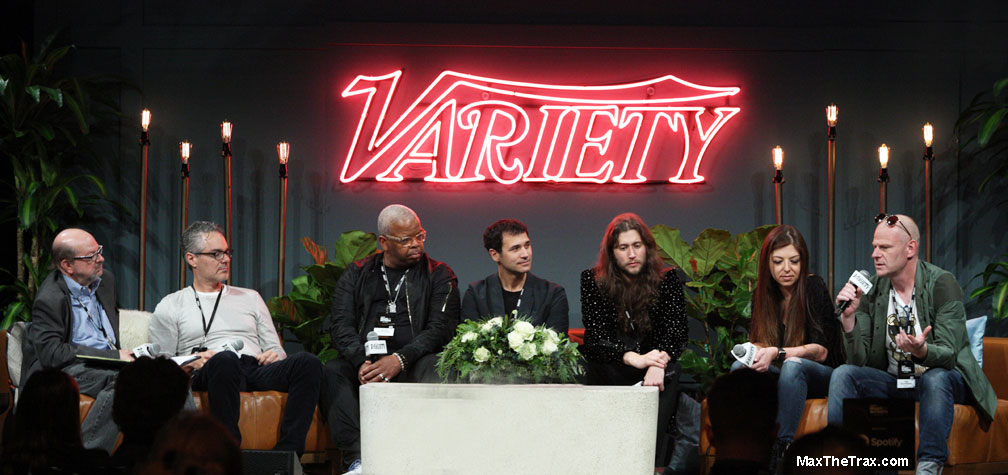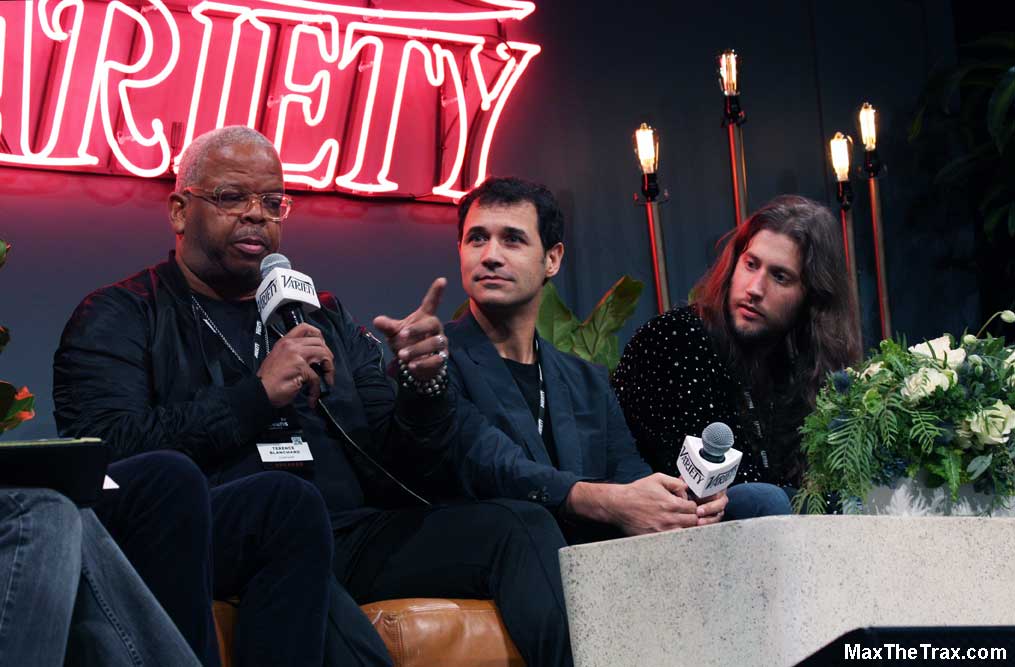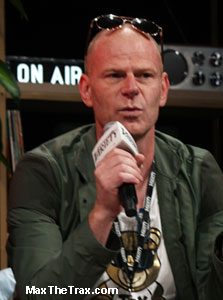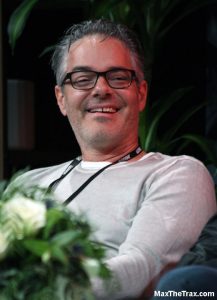
From left, moderator Jon Burlingame leads comserers Marco Beltrami, Terence Blanchard, Ramin Djawadi, Ludwig Göransson, Pinar Toprak and Tom Holkenborg through a spirited discussion at the first annual Variety Music for Screens Summit. (Photo: Paula Parisi / MaxTheTrax)
From the talking drums of Senegal to influence of Dutch electronica and New Orleans jazz, the globalization of world music was on display at the inaugural Variety Music for Screens Conference, where music Jon Burlingame speculated the powerhouse posse assembled for the “High Scorers – Composer Roundtable” session might be “the most diverse composer panel ever: one Turkish, one Dutch, one Swedish, one German Iranian, one African American …. and one from New York,” the journalist quipped.
While Istanbul-born Pinar Toprak drew a spotlight for being the first female composer to crack the studio superhero cartel; the 38-year-old was announced as the hire for Disney’s 2019 release Captain Marvel, starring Brie Larson. Toprak, who began her education in both classical and jazz at age four, is confident she was hired based on her skills and talent. “I’ve scored 40 feature films and have been working in this town almost 20 years. I’ve been studying music since I was four year old, so if I were to get selected only because of my gender they missed out on a whole bunch more,” Toprak said to appreciative applause.

Pinar Toprak, composer for 2018’s Captain Marvel. (Photo: Paula Parisi / MaxTheTrax)
Though Toprak – who contributed additional music to Danny Elfman’s sore for Warner Bros.’ 2017 film Justice League, was mum on Marvel, she said her musical contribution to season three of Epic’s online game Fornite, which she composed with fellow panelist Marco Beltrami (the New Yorker) made her “the coolest mom on the planet” when it was released earlier this year. The world-building combat quest features a major release followed by episodic updates. While the initial collaboration was just a little over an hour of music, “it’s living, breathing, so every few months there’s another batch of music that gets added.
Whether it’s the Silicon Valley crowd, where the “gamergate” gender bullying scandal made headlines in 2014, or the Hollywood tentpole club, Toprak said, “the world only changes by example, not by preaching. The more kids in Turkey see me doing [these scores] the more they can start believing it’s possible, so they’ll study and put in the work.”
Netherlands native Tom Holkenborg – who also makes music under his stage name Junkie XL – had a different set of circumstances to transcend, namely his successful recording and touring career as a musician and DJ in electronic and industrial rock. “When you tell your manager after you have a No. 1 hit worldwide, ‘You know what, I’m going to quit and become a film composer,” it doesn’t go over so well. Around 2011, Holkenborg began his career anew. Like Toprak, he did a stint as an assistant at the hallowed training ground that is Hans Zimmer’s Remote Control. And while he said he was “treated a little different because I had an artist’s career, the work was the same – you had to go through gruesome hours and learn everything. I realized the minute I got here this was going to take a while.”
Now 50, Holkenborg appears to be at the top of his game, with scores for the upcoming Mortal Engines and Alita: Battle Angel, produced by Peter Jackson and James Cameron, respectively, on his 2019 release slate. “It’s been very interesting to work with both of them on a film score the same year.” Holkenborg said the scores are “quite different,” declining to elaborate other than saying, “I think I found a tone where I’m able to keep the brutality of what [his 2015 effort Mad Max: Fury Road] had, yet honor what for me made the films of the ’50s extremely great, and early ‘60s,” he said, referencing the musicality of classic Hollywood composers like Bernard Herrmann. “It’s interesting to do that and see how it all comes together.”

From left, Terence Blanchard, Ramin Djawadi and Ludwig Göransson. (Photo: Paula Parisi / MaxTheTrax)
Genre-blurring was an ongoing theme, and Black Panther composer Ludwig Göransson took it to another level, having decided with director Ryan Coogler, to anchor the score in traditional African music. “It was an extreme challenge,” said the Swedish-born 34-year-old, who began working with Coogler on student films at the University of Southern California. “I traveled to Africa and do my research and study and do my best to pay respect to musicians and African music.”
Göransson said it was quite gratifying when after a year of recording with the musicians in West Africa “when the movie came out they told me they had a chance to see Black Panther in Dakar,” the Senegalese capital, “and said ‘Ludwig, we’re so excited to hear our music– the talking drums, the Fula Flute –represented for the whole world on the big screen.”

Composer Tom Holkenborg worked with Peter Jackson and James Cameron this year. (Photo: Paula Parisi / MaxTheTrax)
New Orleans, Louisiana-bred Terence Blanchard, was steeped in jazz training before starting his 20-year career with director Spike Lee. “It’s been a true honor working for [Lee], because we work on stories that are important to the public debate.” Blanchard harkened back to 1992’s Malcolm X, recounting how “I was in a barbershop in New Orleans where they were having guy talk, then they said, ‘This is the guy that wrote the music for Malcolm X,’ and after five seconds the subject turned to the responsibility of men in the black community, and what we should do to better.” The film got people talking and thinking then, much as the duo’s BlacKkKlansman collaboration has done this year. Blanchard said the film deals with subjects “that are very relevant to what’s going on in this country now,” adding, “It’s kind of sad to think that period [of the film is] the ’70s and here we are in 2018 and we’re still dealing with some of the same issues, if not worse now.”
As to Lee’s musical style, Blanchard, 56, says when he first started working with Lee “the first thing he said to me is he doesn’t like underscoring. It’s not his thing. He likes melodic music under the scenes, and I would have these discussions about having thematic material played underneath scenes that were late with important information to the storyline. Of course he’s the director so he would win the argument every time. But once I started to figure out how to make this thing work for him, it started to create a style.”
Ramin Djawadi, composer for HBO’s Westworld, said his jumping-the-barrier moment was leaving the soundstage to go on tour with the music for Game of Thrones. “The idea came from our show runners – David Benioff and Dan Weiss. In one of the music review sessions at the studio they said, Ramin, you should do a concert.” He ran with the idea. “Twenty years ago if you asked me if I was going to go on tour with an 80 piece orchestra and perform around the country, and even in Europe, I would have laughed. It’s been a childhood dream of mine to go on tour,” says the 44-pianist from Duisburg, Germany. “It was really exciting was to have that connection with the audience, because composing for TV, I usually don’t get to experience people reacting to my music. To see the reaction, right there and then, with a live audience was absolutely fantastic.”

Marco Beltrami’s 2018 scores include Deadpool 2 and A Quiet Place. (Photo: Paula Parisi / MaxTheTrax )
While drawing on traditions that sometimes predate cinema, and certainly TV and games, it’s a composer’s responsibility to challenge the status quo and keep things fresh, said Marco Beltrami. At 56, Beltrami is perhaps best known for his work on Wes Craven’s Scream franchise, but he also has Oscar nominations for 3:10 to Yuma and The Hurt Locker. This year, his work included Deadpool 2 and actor John Krasinski’s directorial effort, the hit thriller A Quiet Place. “Our job as film composers is to push the envelope,” he said, noting that most films reach the composer with that envelope already stuffed with a temp score of existing music dropped in as a placeholder that, ideally, “suggests” the mood the director hopes to achieve. “If you sort of go with what’s there, what [the filmmakers] are used to hearing, it’s just status quo.”Because the temporary score wasn’t written for the story at hand, following it too closely can mean the music “becomes more generic,” the 52-year-old Beltrami warned. “Being able to take the idea and push it and say something new – great things can result. It doesn’t always, but that’s what keeps me going.”
The panel was sponsored by performing rights organization ASCAP and introduced by the group’s senior vp membership Shawn LeMone.


Comments are closed.